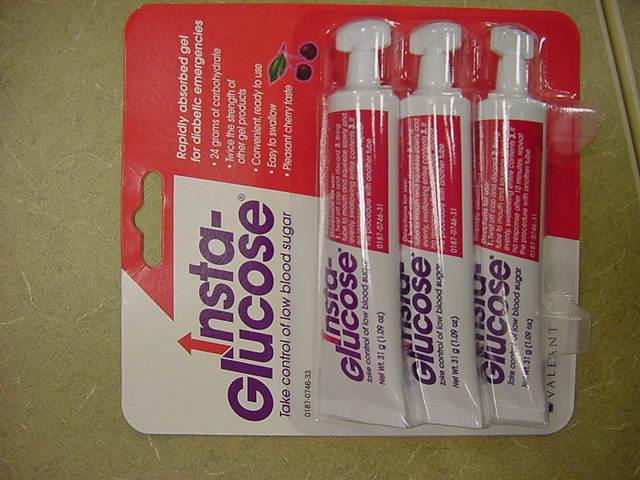|
Insulin Reaction
To treat low blood
glucose, follow the steps below.
- Bring glucose levels
back to normal.
- This requires 10
grams -15 grams (2 teaspoons-3 teaspoons) of sugar, or
- 3 Glucose tabs or a
squeeze of glucose gel, or
- 1/2 to 3/4 cup
regular soda, or
- 10 gumdrops, or
- 5 to 7 Lifesavers,
or
- 1/2 to 3/4 cup
fruit juice
- Check your blood
glucose level, if still low repeat every 15 minutes until normal
- Keep levels normal
with food.
- If you don't plan
on eating food within 30 minutes, eat some starch and/or starch and protein
to prevent another reaction
- Bystanders should not
attempt to administer fluids by mouth to someone who is unconscious because
this may cause the person to vomit or choke. Items, such as syrup, honey, and
cake frosting, smeared inside the cheeks, will melt and be swallowed. This
may wake the person enough for eating or drinking.
- Glucagon is an
injectable hormone that can be carried by people with diabetes or their family
members to use for an insulin reaction. If glucagon is available and a
bystander is trained in its use, it may be injected for severe insulin
reactions while waiting for an ambulance to arrive.
 Medical
Treatment Medical
Treatment
Emergency treatment will typically consist of administration of sugar in the
form of intravenous dextrose solution. Continuous intravenous infusions may be
required. Glucagon may be given by injection if intravenous access is difficult
to obtain or if hypoglycemia continues despite dextrose treatment. Blood sugar
levels will be monitored to guide therapy. Usually, the person can be released
when blood sugar levels have stabilized for several hours and the person has
eaten.
- People with severe
insulin reactions may often be hypothermic (have an abnormally low body
temperature), which may require warming measures by the physician.
- People with
continuing hypoglycemia or elderly persons who have severe insulin reactions
often require hospitalization for continued monitoring and stabilization.
Admission is also required if the person had a heart attack or has severe
infection (sepsis).
-
First Aid Case List -
back to top - |